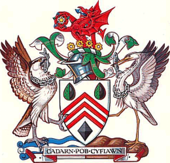West Glamorgan County Council
West Glamorgan County Council Cyngor Sir Gorllewin Morgannwg | |
|---|---|
 | |
| History | |
| Founded | 1 April 1974 |
| Disbanded | 31 March 1996 |
| Preceded by | Swansea County Borough Council Glamorgan County Council |
| Succeeded by | Swansea Neath Port Talbot |
| Elections | |
First election | April 1973 |
Last election | May 1993 |
Next election | N/A |
| Meeting place | |
 | |
| County Hall, Swansea | |
West Glamorgan County Council (Welsh: Cyngor Sir Gorllewin Morgannwg) was the county council of the county of West Glamorgan in south-west Wales, from its creation in 1974 to its abolition in 1996.
History
[edit]The county was created in 1974 under the Local Government Act 1972, covering the western part of the old administrative county of Glamorgan and the city of Swansea, which had been a county borough, independent from Glamorgan County Council.[1]
West Glamorgan County Council was abolished in 1996 under the Local Government (Wales) Act 1994, with the districts in the area being reorganised to become unitary authorities, taking over the functions previously performed by the county council.[2] Since 1 April 1996 the area has been divided into the two unitary authorities of Swansea and Neath Port Talbot.[3]
Political control
[edit]The first election to the county council was held in 1973, initially operating as a shadow authority alongside the outgoing authorities until it came into its powers on 1 April 1974. Labour held a majority of the seats on the council throughout its existence.[4]
| Party in control | Years | |
|---|---|---|
| Labour | 1974–1996 | |
Leadership
[edit]The leaders of the council included:
| Councillor | Party | From | To | |
|---|---|---|---|---|
| Llewellyn Heycock | Labour | 1 Apr 1974 | May 1977 | |
| John Allison[5] | Labour | 1977 | 1989 | |
| Fred Kingdom | Labour | pre-1990 | May 1993 | |
| Tom Jones[6] | Labour | May 1993 | post-1995 | |
Elections
[edit]The first South Glamorgan County Council elections took place in April 1973, when 70 councillors were elected. The number of councillors was reduced to 61 in 1989. The results of each election were as follows:[4]
| Year | Seats | Labour | Conservative | Liberal Democrats[a] | Plaid Cymru | Others | Notes |
|---|---|---|---|---|---|---|---|
| 1973 | 70 | 51 | 9 | 2 | 2 | 6 | |
| 1977 | 70 | 41 | 10 | - | 3 | 16 | |
| 1981 | 70 | 56 | 10 | - | - | 4 | |
| 1985 | 70 | 54 | 7 | 5 | 0 | 4 | |
| 1989 | 61 | 44 | 6 | 2 | 1 | 8 | New division boundaries.[7] |
| 1993 | 61 | 47 | 3 | 3 | 1 | 7 | |
Premises
[edit]The county council was initially based at the Guildhall in Swansea but moved to County Hall in Swansea in 1982.[8][9]
References
[edit]- ^ "Swansea CB". Vision of Britain. Retrieved 27 October 2022.
- ^ "Local Government (Wales) Act 1994", legislation.gov.uk, The National Archives, 1994 c. 19, retrieved 27 October 2022
- ^ "West Glamorgan County Council records". Archives Hub. Retrieved 18 October 2019.
- ^ a b "Compositions calculator". The Elections Centre. 4 March 2016. Retrieved 27 October 2022.
- ^ "Former Swansea council leader John Allison dies". Wales Online. 30 May 2012. Retrieved 27 October 2022.
- ^ "Tom is county leader". Neath Guardian. 20 May 1993. p. 11. Retrieved 27 October 2022.
- ^ "The County of West Glamorgan (Electoral Arrangements) Order 1989", legislation.gov.uk, The National Archives, SI 1989/127, retrieved 27 October 2022
- ^ Whitaker's Almanack 1979, p. 677
- ^ Whitaker's Almanack 1983, p. 677
